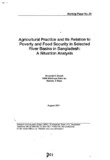Agricultural practice and its relation to poverty and food security in selected river basins in Bangladesh: a situation analysis
Citation
Ghosh, S. C., Rahman, A. M., & Raza, W. A. (2011, August). Agricultural practice and its relation to poverty and food security in selected river basins in Bangladesh: a situation analysis. Research Reports (2010): Economic Studies, Vol - XXVII, 1–26.Abstract
Poverty and food security in the context of Bangladesh has become a major concern
over time. While efforts have been intensified to increase crop yield through increased
land use, using inorganic fertilizers, pesticides, irrigation equipments, and so forth,
these activities are frequently threatened by natural and biological hazards such as
floods, cyclones, tornadoes, drought, and insects/pests. Moreover, it is assumed that
the climate change induced changes of precipitation pattern would have an impact
on the flooding characteristics across the basins of the Ganges, Meghna and the
Brahmaputra (GMB) rivers, which might influence the agricultural land use and
livelihood of people living near the river basin. This study attempts to present a
situation analysis in the context of agricultural practices in the GMB basins and its
relation to poverty and food security. The study finds that the riverbank areas are
encumbered with a greater burden of poverty compared to the comparison areas. In
terms of food security, despite the fact that one third of the households reported
being chronically poor, more than 95% households in 2008 reported to be food
secured. Hence, the households in comparison areas were found in a relatively better
situation compared to the riverbank areas.

